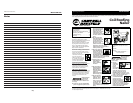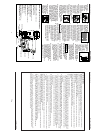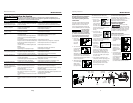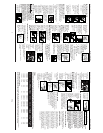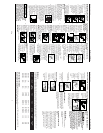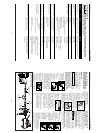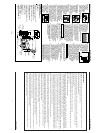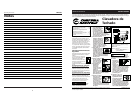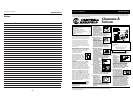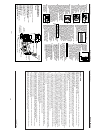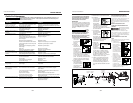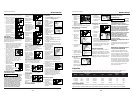
2. Remove all nails
from the magazine
(see Loading/
Unloading).
3.
Make sure the trigger
and Work Contact
Element (WCE) move
freely up and down
without sticking or
binding.
4. Reconnect air
supply to the
nailer.
5.
Depress the
WCE against the
work surface
without pulling
the trigger. The
nailer
MUST
NOT OPERATE
. Do not use the tool
if it operates without pulling the
trigger. Personal injury may result.
6. Remove the nail-
er from the
work surface.
The
WCE
must
return to its
original down
position.
Depress the trigger. The nailer
MUST NOT OPERATE. Do not use
the tool if it operates while lifted
from the work surface. Personal
injury may result.
7. Pull the
trigger and
depress the
WCE
against
the work
surface. The
nailer
MUST OPERATE.
8. Depress the
WCE
against
the work sur-
face. Pull the
trigger. The
nailer
MUST
OPERATE
.
LOADING/UNLOADING THE NAILER
1. Always connect the tool to the air
supply before
loading fasteners.
2. Pull the door
latch down and
open the door.
Open magazine
cover.
OIL DAILYOIL DAILY
O
x
y
g
e
n
Oxygen
N
i
t
r
o
g
e
n
Nitrogen
H
y
d
r
o
g
e
n
Hydrogen
C
a
r
b
o
n
D
i
o
x
i
d
e
Carbon Dioxide
Movement
OIL DAILYOIL DAILY
OxygenOxygen
NitrogenNitrogen
HydrogenHydrogen
Carbon DioxideCarbon Dioxide
OIL DAILYOIL DAILY
O
x
y
g
e
n
Oxygen
N
i
t
r
o
g
e
n
Nitrogen
H
y
d
r
o
g
e
n
Hydrogen
C
a
r
b
o
n
D
i
o
x
i
d
e
Carbon Dioxide
MULTIPLE NAIL OPERATION
This method is preferred for faster, less
precise nail placement.
a. Depress trigger while
holding tool above
work surface.
b. Depress work contact
element by tapping
the nose of tool
against work surface
in a bouncing
motion.
c. Each time the work
contact element is
depressed, a fastener
will be driven.
ADJUSTING NAIL PENETRATION
The RN1545 is equipped with an
adjustable depth of drive feature. This
feature allows the user to determine how
deep the fastener will be driven into the
work surface.
a. Adjust operating pressure so nails are
driven consistently. Do not exceed
115 psi.
b. To adjust depth of
drive, loosen safety
assembly lock nuts
with a 10mm wrench.
To increase depth of
drive, adjust safety
assembly upward. To decrease depth
of drive, adjust safety assembly down-
ward. Make certain both lock nuts
are tightened securely after each
adjustment.
c. Make sure trigger
and work contact
element (WCE) move
freely up and down
without binding or
sticking after each
adjustment.
WORK CONTACT ELEMENT (WCE)
Check the opera-
tion of the Work
Contact Element (WCE) trip mechanism
before each use. The WCE must move
freely without binding through its entire
travel distance. The WCE spring must
return the WCE to its fully extended posi-
tion after being depressed. Do not oper-
ate the nailer if the WCE trip mechanism is
not operating properly. Personal injury
may occur.
1. Disconnect the
air supply from
the nailer.
3. Check the
nail platform
adjustment.
Change nail plat-
form settings by
pulling up on the post and twisting
to the correct setting:
a. 7/8" and 1" nails -
use top setting.
b. 1-1/4" and 1-1/2" nails -
use middle setting.
c. 1-3/4" nails - use bottom setting.
The nail platform must be set for
the length of nails to be used or the
nails will not feed properly.
4. Load the coil of
nails over the post
in the magazine.
Make sure to
uncoil enough
nails to reach the
feed pawl. The
first nail should be placed in front
of the front tooth on the feed pawl
in the driver channel and the nail
heads must be in the slot in the
nose.
5. Close the magazine
cover and door latch.
6. Always unload all fasteners before
removing tool from service.
Unloading is the reverse of loading,
except always
disconnect the air
hose before unloading.
SHINGLE GUIDE ADJUSTMENT
1. Disconnect the
air supply from
the nailer.
2.
Loosen the two
screws on the
shingle guide under the magazine.
3. Place the
shingle
guide
against the
front edge
of the
shingle.
4. Adjust the shingle guide until the
desired shingle exposure is
achieved.
5. Tighten the two screws on the shin-
gle guide.
Model RN1545
Operating Instructions
4
OIL DAILYOIL DAILY
O
x
y
g
e
n
Oxygen
N
i
t
r
o
g
e
n
Nitrogen
H
y
d
r
o
g
e
n
Hydrogen
C
a
r
b
o
n
D
i
o
x
i
d
e
Carbon Dioxide
3. Coloque la
guía contra
el borde
delantero de
la teja.
4. Ajuste la guía
de tejas hasta
lograr la exposición deseada para la
teja.
5. Apriete los dos tornillos de la guía
para tejas de madera.
QUE HACER CUANDO LA CLAVADO-
RA TENGA UN CLAVO ATASCADO
1. Desconecte la
clavadora de
la fuente de
suministro de
aire.
2. Tire el retén
de la
portezuela
hacia abajo y
abra la tapa
del cargador.
3. Saque los clavos
de la nariz del
clavador.
4. Sujete el clavo
atascado con unas
pinzas y extráiga-
lo del clavador.
Metodo alterno:
1. Inserte un
destornillador
en la nariz del
clavador.
Empuje hacia
arriba la hoja
del expulsador a fin de liberar el
clavo atascado.
2. Sujete el clavo
con unas pin-
zas y sáquelo
del clavador.
Limpieza del Clavador
1. Desconectar
el suministro
de aire del
clavador.
2. Limpie las
acumula-
ciones de
alquitrán con
aceite com-
bustible
kerosén #2 o
con combustible diesel. No permita
que el combustible penetre en el
cilindro del expulsador pues se
puede causar daño. Seque comple-
tamente el clavador antes de usarlo.
Servicio Técnico
Si desea hacer alguna pregunta refer-
ente a la reparación u operación de las
clavadoras, sírvase llamar a nuestro
número especial, 1-800-543-6400. Si
llama desde Ohio o fuera de los
Estados Unidos continentales,
comuníquese con nosotros al
1-513-3678-1182.
Clavos et Repuestos
Use sola-
mente
sujetadores Campbell Hausfeld origi-
nales (o su equivalente) - (vea la
información sobre intercambio de
sujetadores). Use solamente partes
de repuesto Campbell Hausfeld origi-
nales. Nunca substituya las partes.
No use partes modificadas o partes
que no den un rendimiento equiva-
lente al equipo original. El
rendimiento de las herramientas, la
seguridad y la duración pueden verse
reducidos. Cuando ordene partes de
repuesto o sujetadores, especifique
el número de la parte.
Para reparar la clavadora
Las reparaciones de la clavadora las
debe hacer SOLAMENTE un técnico cal-
ificado que tenga experiencia.
Para colocarle los sellos
Cada vez que repare una clavadora
deberá limpiarle y lubricarle las partes
internas. Le recomendamos que use
Parker O-lube o un lubricante equiva-
lente en todos los anillos en O. A cada
anillo en O se le debe dar un baño de
lubricante para anillos antes de insta-
larlos. Igualmente, deberá ponerle un
poco de aceite a todas las piezas que se
mueven y muñones. Finalmente,
después de haberla ensamblado y antes
de probar la herramienta deberá pon-
erle unas cuantas gotas de aceite sin
detergente 30W u otro aceite similar,
en las líneas de aire.
Modelo RN1545
5-Sp
Manual de Instrucciones
!
ADVERTENCIA
OIL DAILYOIL DAILY
Ox
y
g
en
Oxygen
Ni
t
ro
g
e
n
Nitrogen
H
yd
ro
g
e
n
Hydrogen
C
ar
b
o
n
D
i
ox
i
d
e
Carbon Dioxide
O
x
y
g
e
n
Oxygen
N
i
t
r
o
g
e
n
Nitrogen
H
y
d
r
o
g
e
n
Hydrogen
C
a
r
b
o
n
D
i
o
x
i
d
e
Carbon Dioxide
OIL DAILYOIL DAILY
O
x
y
g
e
n
Oxygen
N
i
t
r
o
g
e
n
Nitrogen
H
y
d
r
o
g
e
n
Hydrogen
C
a
r
b
o
n
D
i
o
x
i
d
e
Carbon Dioxide
O
x
y
g
e
n
Oxygen
N
i
t
r
o
g
e
n
Nitrogen
H
y
d
r
o
g
e
n
Hydrogen
C
a
r
b
o
n
D
i
o
x
i
d
e
Carbon Dioxide
SHINGLE EXPOSURE
OIL DAILYOIL DAILY
OxygenOxygen
NitrogenNitrogen
HydrogenHydrogen
Carbon DioxideCarbon Dioxide
Movement
OIL DAILYOIL DAILY
O
x
y
g
e
n
Oxygen
N
i
t
r
o
g
e
n
Nitrogen
H
y
d
r
o
g
e
n
Hydrogen
C
a
r
b
o
n
D
i
o
x
i
d
e
Carbon Dioxide
OIL DAILYOIL DAILY
O
x
y
g
e
n
Oxygen
N
i
t
r
o
g
e
n
Nitrogen
H
y
d
r
o
g
e
n
Hydrogen
C
a
r
b
o
n
D
i
o
x
i
d
e
Carbon Dioxide
OIL DAILYOIL DAILY
O
x
y
g
e
n
Oxygen
N
i
t
r
o
g
e
n
Nitrogen
H
y
d
r
o
g
e
n
Hydrogen
C
a
r
b
o
n
D
i
o
x
i
d
e
Carbon Dioxide
1.
2.
OIL DAILYOIL DAILY
O
x
y
g
e
n
Oxygen
N
i
t
r
o
g
e
n
Nitrogen
H
y
d
r
o
g
e
n
Hydrogen
C
a
r
b
o
n
D
i
o
x
i
d
e
Carbon Dioxide
OIL DAILYOIL DAILY
O
xy
g
e
n
Oxygen
N
i
t
r
o
g
e
n
Nitrogen
H
y
d
r
og
e
n
Hydrogen
C
a
r
b
o
n
D
i
o
x
i
d
e
Carbon Dioxide
1.
2.
Clavos
Estos clavos para acabado de Campbell Hausfeld los puede comprar en su tienda más cercana. Si necesita ayuda para encon-
trar un artículo, comuníquese al 1-800-543-6400. Los clavos de Campbell Hausfeld cumplen o exceden el estándar ASTM F1667
Diámetros Tipo de Fusión de Clavos por Clavos por
Modelo # Largo
de los vástagos espiga
Cabeza Acabado
la bobina bobina Caja
FC152200 22,2 mm .120" Lisa Redonda Galvanizado Soldadura 120 7200
FC152500 2,54 cm .120" Lisa Redonda Galvanizado Soldadura 120 7200
FC153000 3,18 cm .120" Lisa Redonda Galvanizado Soldadura 120 7200
FC154000 3,81 cm .120" Lisa Redonda Galvanizado Soldadura 120 7200
FC154500 4,45 cm .120" Lisa Redonda Galvanizado Soldadura 120 7200
Información de intercambio
Los clavos usados con la clavadora para acabado RN1545 de Campbell Hausfeld también se pueden usar con las clavadoras
Rollo de techado ATRO, Bostitch RN45, N12B, Hitachi NV45AB, Porter Cable RN175, Sears 18324 y Senco SCN200R.
OIL DAILYOIL DAILY
O
x
y
g
e
n
Oxygen
N
i
t
r
o
g
e
n
Nitrogen
H
y
d
r
o
g
e
n
Hydrogen
C
a
r
b
o
n
D
i
o
x
i
d
e
Carbon Dioxide
OIL DAILYOIL DAILY
O
x
y
g
e
n
Oxygen
N
i
t
r
o
g
e
n
Nitrogen
H
y
d
r
o
g
e
n
Hydrogen
C
a
r
b
o
n
D
i
o
x
i
d
e
Carbon Dioxide
O
x
y
g
e
n
Oxygen
N
i
t
r
o
g
e
n
Nitrogen
H
y
d
r
o
g
e
n
Hydrogen
C
a
r
b
o
n
D
i
o
x
i
d
e
Carbon Dioxide
SHINGLE EXPOSURE
Exposición para la teja



